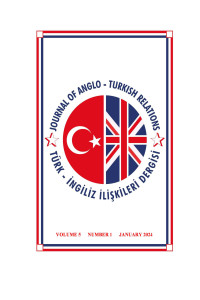Abstract
In this article, in which the importance of the Hospice institution, which we can read as the bodily end of the social state practices of the late Ottoman Empire, for poor women who are beyond the limits of legitimacy, is discussed based on various archive documents, it is aimed to contribute to the study of the history of poverty in the context of gender. The function of the institution in the fight against women's poverty, the definition of "acceptable poor woman" by the state official through the lens of the institution, and the evaluation of policies and practices for those outside the legitimacy limit constitute the basic framework of the study.
References
- PEARCE, Diana. “The Feminization of Poverty: Women, work and welfare”, The Urban and Social Change Review, S., 1-2, 1978, pp. 28-36.
- YILDIRIM, Nuran. İstanbul Darülaceze Müessesesi Tarihi, Darülaceze Vakfı Yayınları, İstanbul, 1996.
Abstract
Geç dönem Osmanlı İmparatorluğu sosyal devlet uygulamalarının cismani miadı olarak okuyabileceğimiz Darülaceze kurumunun, meşruiyet sınırları dışında kalan yoksul kadınlar açısından öneminin çeşitli arşiv vesikalarından hareketle tartışıldığı elinizdeki makale, yoksulluk tarihi çalışmalarına toplumsal cinsiyet bağlamında katkı sunmayı amaçlamaktadır. Kurumun kadın yoksulluğu ile mücadeledeki işlevi, kurum merceğinden devlet ricalinin “makbul yoksul kadın” tanımı, meşruiyet sınırı dışında kalanlara yönelik politika ve uygulamaların değerlendirilmesi çalışmanın temel çerçevesini oluşturmaktadır.
References
- PEARCE, Diana. “The Feminization of Poverty: Women, work and welfare”, The Urban and Social Change Review, S., 1-2, 1978, pp. 28-36.
- YILDIRIM, Nuran. İstanbul Darülaceze Müessesesi Tarihi, Darülaceze Vakfı Yayınları, İstanbul, 1996.
Details
| Primary Language | Turkish |
|---|---|
| Subjects | International History |
| Journal Section | Research Articles |
| Authors | |
| Publication Date | January 17, 2024 |
| Submission Date | July 7, 2023 |
| Acceptance Date | July 7, 2023 |
| Published in Issue | Year 2024 Volume: 5 Issue: 1 |
Journal of Anglo Turkish Relations © 2025 by Behçet Kemal Yesilbursa is licensed under CC BY-NC-SA 4.0


